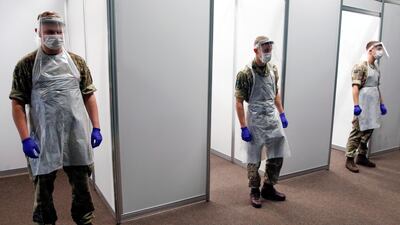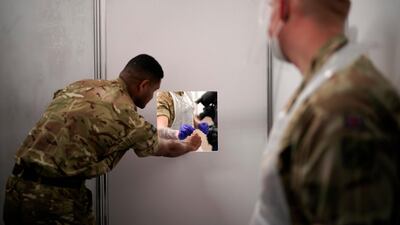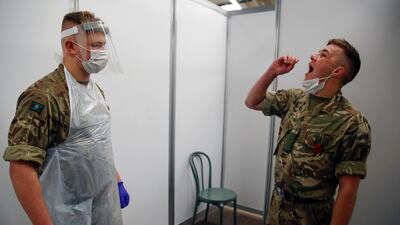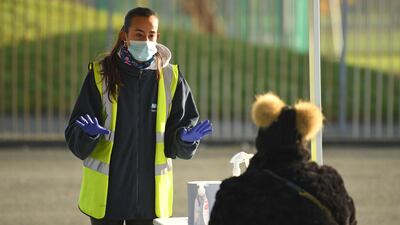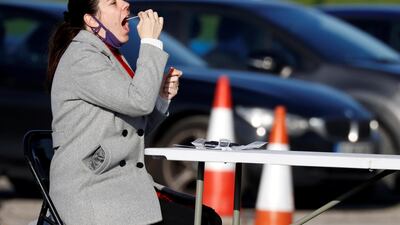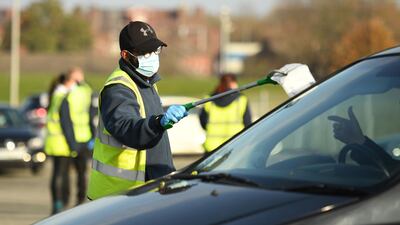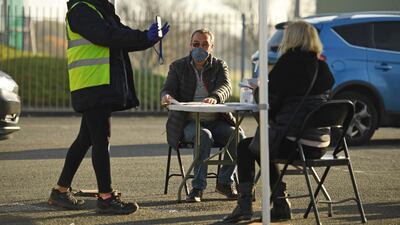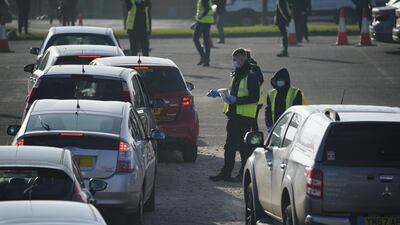Jurgen Klopp has urged the city of Liverpool to launch its “fightback” against coronavirus as he appeals for everyone to get tested.
The Liverpool Football Club manager's plea comes as troops were posted to the northern English city this week for the UK government's first citywide testing regime, which began on Friday.
Liverpool residents are being offered repeat tests - regardless of whether they have symptoms or not.
Klopp is a star recruit in the government’s efforts to get as many Liverpudlians tested as possible.
“Let’s start the fightback against Covid - let’s get tested,” the Liverpool boss said.
“Regular testing has kept the Premier League going and allowed us to be out on the pitch every week.
“It takes 10 seconds to take a test and 10 days to make a difference.
“Let’s help Liverpool get out of Tier 3. Do it for yourself, your family, your colleagues and your city. Let’s do it together, let’s do it for Liverpool.”
If the two-week pilot is successful, the rapid testing scheme could be rolled out elsewhere as part of Prime Minister Boris Johnson's lockdown "exit strategy".
About 2,000 soldiers were sent to the city this week to help carry out the tests.
Liverpool testing commander Lieutenant-General Tyrone Richard Urch said the rapid tests could deliver a result in under an hour.
He told BBC Radio 4's Today programme: "We're piloting the lateral flow device, which is the test that can be done very quickly.
“I’m led to believe we can have results in under an hour.”
Liverpool was the first area to be put into the very high alert level of England's three-tier system of Covid-19 restrictions.
A national lockdown in England began on Thursday.
New infections have stabilised at about 50,000 a day, the Office for National Statistics (ONS) said on Friday, indicating a levelling off in the steep rise of cases even before the country was pushed into its second shutdown.
The ONS said there was an estimated daily 45,700 new cases per day in the week to Oct 31, down slightly from the previous week's estimate of 51,900.
Liverpool's director of public health Matthew Ashton said the aim of the pilot was to lower levels of the virus in the city and exit national lockdown in a “stronger” position to tackle further outbreaks, hinting that the pilot could go on for longer than 10 days if it proved successful.
Mr Ashton told the BBC: "One of the things I want to make sure of is that the pilot lasts long enough for us to be able to see the impact of it.
"We are open for an initial 10 days, but I'm not getting the readings that it's 10 days and turn off.
“We are able to expand it, extend it, to make sure the pilot fits."
Liverpool mayor Joe Anderson, whose brother died of Covid-19 last month, said the pilot could save lives and "get the city out of tier three restrictions".
Mr Johnson said on Thursday the kind of cheap new tests being used in Liverpool "can be a massive and possibly decisive use to us in this country in defeating the virus".
The government has already spent £12 billion ($16 billion) on testing programmes across the UK.
But researchers say most members of the public have been failing to isolate after testing positive, and support staff have struggled to reach all of their contacts to limit the spread of the virus.
Pressure is continuing to build on the government to ensure England emerges from lockdown on December 2.
MPs including former prime minister Theresa May this week criticised Number 10 for using data that was “riddled with errors” to justify the second shutdown.
Modelling had suggested that virus deaths could hit 1,500 per day - surpassing the first peak in spring.
The projection was quietly revised down last night, with the incorrect graph removed and replaced with another.
Mrs May asked whether “figures were chosen to support the policy rather than the policy being based on the figures”.
Chief scientific adviser Sir Patrick Vallance said he “regretted” that he did not make clear that the scenarios were models rather than projections.
Meanwhile, a leading Oxford geneticist suggested people should be paid to receive the Covid vaccine in an attempt to build up herd immunity.
Prof Julian Savulescu said such incentives could help overcome public resistance to getting the inoculation due to health and safety fears.
The incentive could be either financial or “payment in kind” - such as being allowed to take off a face mask in public, he suggested.
He wrote in the Journal of Medical Ethics: "The advantage of payment for risk is that people are choosing voluntarily to take it on.
“As long as we are accurate in conveying the limitations in our confidence about the risks and benefits of a vaccine, then it is up to individuals to judge whether they are worth payment.”
Scientists say 50 to 80 per cent of the population needs to be vaccinated to achieve herd immunity but the government won’t be making the any vaccine mandatory.
Prof Savulescu did not believe mandatory vaccinations were ethical without eliminating the risk of a vaccine.
"However, another way of looking at this is that those at low risk are being asked to do a job, which entails some risk, albeit a very low one,” he said.
“So they should be paid for the risk they are taking for the sake of providing a public good.”
The more serious side of specialty coffee
While the taste of beans and freshness of roast is paramount to the specialty coffee scene, so is sustainability and workers’ rights.
The bulk of genuine specialty coffee companies aim to improve on these elements in every stage of production via direct relationships with farmers. For instance, Mokha 1450 on Al Wasl Road strives to work predominantly with women-owned and -operated coffee organisations, including female farmers in the Sabree mountains of Yemen.
Because, as the boutique’s owner, Garfield Kerr, points out: “women represent over 90 per cent of the coffee value chain, but are woefully underrepresented in less than 10 per cent of ownership and management throughout the global coffee industry.”
One of the UAE’s largest suppliers of green (meaning not-yet-roasted) beans, Raw Coffee, is a founding member of the Partnership of Gender Equity, which aims to empower female coffee farmers and harvesters.
Also, globally, many companies have found the perfect way to recycle old coffee grounds: they create the perfect fertile soil in which to grow mushrooms.
LAST-16 EUROPA LEAGUE FIXTURES
Wednesday (Kick-offs UAE)
FC Copenhagen (0) v Istanbul Basaksehir (1) 8.55pm
Shakhtar Donetsk (2) v Wolfsburg (1) 8.55pm
Inter Milan v Getafe (one leg only) 11pm
Manchester United (5) v LASK (0) 11pm
Thursday
Bayer Leverkusen (3) v Rangers (1) 8.55pm
Sevilla v Roma (one leg only) 8.55pm
FC Basel (3) v Eintracht Frankfurt (0) 11pm
Wolves (1) Olympiakos (1) 11pm
What can victims do?
Always use only regulated platforms
Stop all transactions and communication on suspicion
Save all evidence (screenshots, chat logs, transaction IDs)
Report to local authorities
Warn others to prevent further harm
Courtesy: Crystal Intelligence
The%20Roundup
%3Cp%3EDirector%3A%20Lee%20Sang-yong%3Cbr%3EStars%3A%20Ma%20Dong-seok%2C%20Sukku%20Son%2C%20Choi%20Gwi-hwa%3Cbr%3ERating%3A%204%2F5%3C%2Fp%3E%0A
'Saand Ki Aankh'
Produced by: Reliance Entertainment with Chalk and Cheese Films
Director: Tushar Hiranandani
Cast: Taapsee Pannu, Bhumi Pednekar, Prakash Jha, Vineet Singh
Rating: 3.5/5 stars
Tips to keep your car cool
- Place a sun reflector in your windshield when not driving
- Park in shaded or covered areas
- Add tint to windows
- Wrap your car to change the exterior colour
- Pick light interiors - choose colours such as beige and cream for seats and dashboard furniture
- Avoid leather interiors as these absorb more heat
The Pope's itinerary
Sunday, February 3, 2019 - Rome to Abu Dhabi
1pm: departure by plane from Rome / Fiumicino to Abu Dhabi
10pm: arrival at Abu Dhabi Presidential Airport
Monday, February 4
12pm: welcome ceremony at the main entrance of the Presidential Palace
12.20pm: visit Abu Dhabi Crown Prince at Presidential Palace
5pm: private meeting with Muslim Council of Elders at Sheikh Zayed Grand Mosque
6.10pm: Inter-religious in the Founder's Memorial
Tuesday, February 5 - Abu Dhabi to Rome
9.15am: private visit to undisclosed cathedral
10.30am: public mass at Zayed Sports City – with a homily by Pope Francis
12.40pm: farewell at Abu Dhabi Presidential Airport
1pm: departure by plane to Rome
5pm: arrival at the Rome / Ciampino International Airport
If you go
The Flights
Emirates and Etihad fly direct to Johannesburg from Dubai and Abu Dhabi respectively. Economy return tickets cost from Dh2,650, including taxes.
The trip
Worldwide Motorhoming Holidays (worldwidemotorhomingholidays.co.uk) operates fly-drive motorhome holidays in eight destinations, including South Africa. Its 14-day Kruger and the Battlefields itinerary starts from Dh17,500, including campgrounds, excursions, unit hire and flights. Bobo Campers has a range of RVs for hire, including the 4-berth Discoverer 4 from Dh600 per day.
Frida%20
%3Cp%3E%3Cstrong%3EDirector%3A%20%3C%2Fstrong%3ECarla%20Gutierrez%3C%2Fp%3E%0A%3Cp%3E%3Cstrong%3EStarring%3A%3C%2Fstrong%3E%20Frida%20Kahlo%3C%2Fp%3E%0A%3Cp%3E%3Cstrong%3ERating%3A%3C%2Fstrong%3E%204%2F5%3C%2Fp%3E%0A
The%20specs
%3Cp%3E%3Cstrong%3EEngine%3A%20%3C%2Fstrong%3E4.0-litre%20flat%206-cylinder%0D%3Cbr%3E%3Cstrong%3ETransmission%3A%20%3C%2Fstrong%3E7-speed%20PDK%0D%3Cbr%3E%3Cstrong%3EPower%3A%20%3C%2Fstrong%3E500hp%0D%3Cbr%3E%3Cstrong%3ETorque%3A%20%3C%2Fstrong%3E450Nm%0D%3Cbr%3E%3Cstrong%3EPrice%3A%20%3C%2Fstrong%3EDh530%2C300%20as%20tested%0D%3Cbr%3E%3Cstrong%3EOn%20sale%3A%3C%2Fstrong%3E%20Now%3C%2Fp%3E%0A
EA Sports FC 26
Publisher: EA Sports
Consoles: PC, PlayStation 4/5, Xbox Series X/S
Rating: 3/5
Farage on Muslim Brotherhood
Nigel Farage told Reform's annual conference that the party will proscribe the Muslim Brotherhood if he becomes Prime Minister.
"We will stop dangerous organisations with links to terrorism operating in our country," he said. "Quite why we've been so gutless about this – both Labour and Conservative – I don't know.
“All across the Middle East, countries have banned and proscribed the Muslim Brotherhood as a dangerous organisation. We will do the very same.”
It is 10 years since a ground-breaking report into the Muslim Brotherhood by Sir John Jenkins.
Among the former diplomat's findings was an assessment that “the use of extreme violence in the pursuit of the perfect Islamic society” has “never been institutionally disowned” by the movement.
The prime minister at the time, David Cameron, who commissioned the report, said membership or association with the Muslim Brotherhood was a "possible indicator of extremism" but it would not be banned.
David Haye record
Total fights: 32
Wins: 28
Wins by KO: 26
Losses: 4
'Champions'
Director: Manuel Calvo
Stars: Yassir Al Saggaf and Fatima Al Banawi
Rating: 2/5
SPECS
%3Cp%3E%3Cstrong%3EEngine%3A%3C%2Fstrong%3E%201.5-litre%204-cylinder%3Cbr%3E%3Cstrong%3EPower%3A%3C%2Fstrong%3E%20101hp%3Cbr%3E%3Cstrong%3ETorque%3A%3C%2Fstrong%3E%20135Nm%3Cbr%3E%3Cstrong%3ETransmission%3C%2Fstrong%3E%3A%20Six-speed%20auto%3Cbr%3E%3Cstrong%3EPrice%3A%3C%2Fstrong%3E%20From%20Dh79%2C900%3Cbr%3E%3Cstrong%3EOn%20sale%3A%3C%2Fstrong%3E%20Now%3C%2Fp%3E%0A
Selected fixtures
All times UAE
Wednesday
Poland v Portugal 10.45pm
Russia v Sweden 10.45pm
Friday
Belgium v Switzerland 10.45pm
Croatia v England 10.45pm
Saturday
Netherlands v Germany 10.45pm
Rep of Ireland v Denmark 10.45pm
Sunday
Poland v Italy 10.45pm
Monday
Spain v England 10.45pm
Tuesday
France v Germany 10.45pm
Rep of Ireland v Wales 10.45pm
THURSDAY'S FIXTURES
4pm Maratha Arabians v Northern Warriors
6.15pm Deccan Gladiators v Pune Devils
8.30pm Delhi Bulls v Bangla Tigers
Company%20Profile
%3Cp%3E%3Cstrong%3EName%3A%3C%2Fstrong%3E%20Raha%3Cbr%3E%3Cstrong%3EStarted%3A%3C%2Fstrong%3E%202022%3Cbr%3E%3Cstrong%3EBased%3A%3C%2Fstrong%3E%20Kuwait%2FSaudi%3Cbr%3E%3Cstrong%3EIndustry%3A%3C%2Fstrong%3E%20Tech%20Logistics%3Cbr%3E%3Cstrong%3EFunding%3A%3C%2Fstrong%3E%20%2414%20million%3Cbr%3E%3Cstrong%3EInvestors%3A%3C%2Fstrong%3E%20Soor%20Capital%2C%20eWTP%20Arabia%20Capital%2C%20Aujan%20Enterprises%2C%20Nox%20Management%2C%20Cedar%20Mundi%20Ventures%3Cbr%3E%3Cstrong%3ENumber%20of%20employees%3A%3C%2Fstrong%3E%20166%3C%2Fp%3E%0A
At Eternity’s Gate
Director: Julian Schnabel
Starring: Willem Dafoe, Oscar Isaacs, Mads Mikkelsen
Three stars
Skoda Superb Specs
Engine: 2-litre TSI petrol
Power: 190hp
Torque: 320Nm
Price: From Dh147,000
Available: Now
Ten tax points to be aware of in 2026
1. Domestic VAT refund amendments: request your refund within five years
If a business does not apply for the refund on time, they lose their credit.
2. E-invoicing in the UAE
Businesses should continue preparing for the implementation of e-invoicing in the UAE, with 2026 a preparation and transition period ahead of phased mandatory adoption.
3. More tax audits
Tax authorities are increasingly using data already available across multiple filings to identify audit risks.
4. More beneficial VAT and excise tax penalty regime
Tax disputes are expected to become more frequent and more structured, with clearer administrative objection and appeal processes. The UAE has adopted a new penalty regime for VAT and excise disputes, which now mirrors the penalty regime for corporate tax.
5. Greater emphasis on statutory audit
There is a greater need for the accuracy of financial statements. The International Financial Reporting Standards standards need to be strictly adhered to and, as a result, the quality of the audits will need to increase.
6. Further transfer pricing enforcement
Transfer pricing enforcement, which refers to the practice of establishing prices for internal transactions between related entities, is expected to broaden in scope. The UAE will shortly open the possibility to negotiate advance pricing agreements, or essentially rulings for transfer pricing purposes.
7. Limited time periods for audits
Recent amendments also introduce a default five-year limitation period for tax audits and assessments, subject to specific statutory exceptions. While the standard audit and assessment period is five years, this may be extended to up to 15 years in cases involving fraud or tax evasion.
8. Pillar 2 implementation
Many multinational groups will begin to feel the practical effect of the Domestic Minimum Top-Up Tax (DMTT), the UAE's implementation of the OECD’s global minimum tax under Pillar 2. While the rules apply for financial years starting on or after January 1, 2025, it is 2026 that marks the transition to an operational phase.
9. Reduced compliance obligations for imported goods and services
Businesses that apply the reverse-charge mechanism for VAT purposes in the UAE may benefit from reduced compliance obligations.
10. Substance and CbC reporting focus
Tax authorities are expected to continue strengthening the enforcement of economic substance and Country-by-Country (CbC) reporting frameworks. In the UAE, these regimes are increasingly being used as risk-assessment tools, providing tax authorities with a comprehensive view of multinational groups’ global footprints and enabling them to assess whether profits are aligned with real economic activity.
Contributed by Thomas Vanhee and Hend Rashwan, Aurifer
How will Gen Alpha invest?
Mark Chahwan, co-founder and chief executive of robo-advisory firm Sarwa, forecasts that Generation Alpha (born between 2010 and 2024) will start investing in their teenage years and therefore benefit from compound interest.
“Technology and education should be the main drivers to make this happen, whether it’s investing in a few clicks or their schools/parents stepping up their personal finance education skills,” he adds.
Mr Chahwan says younger generations have a higher capacity to take on risk, but for some their appetite can be more cautious because they are investing for the first time. “Schools still do not teach personal finance and stock market investing, so a lot of the learning journey can feel daunting and intimidating,” he says.
He advises millennials to not always start with an aggressive portfolio even if they can afford to take risks. “We always advise to work your way up to your risk capacity, that way you experience volatility and get used to it. Given the higher risk capacity for the younger generations, stocks are a favourite,” says Mr Chahwan.
Highlighting the role technology has played in encouraging millennials and Gen Z to invest, he says: “They were often excluded, but with lower account minimums ... a customer with $1,000 [Dh3,672] in their account has their money working for them just as hard as the portfolio of a high get-worth individual.”
One-off T20 International: UAE v Australia
When: Monday, October 22, 2pm start
Where: Abu Dhabi Cricket, Oval 1
Tickets: Admission is free
Australia squad: Aaron Finch (captain), Mitch Marsh, Alex Carey, Ashton Agar, Nathan Coulter-Nile, Chris Lynn, Nathan Lyon, Glenn Maxwell, Ben McDermott, Darcy Short, Billy Stanlake, Mitchell Starc, Andrew Tye, Adam Zampa, Peter Siddle
Explainer: Tanween Design Programme
Non-profit arts studio Tashkeel launched this annual initiative with the intention of supporting budding designers in the UAE. This year, three talents were chosen from hundreds of applicants to be a part of the sixth creative development programme. These are architect Abdulla Al Mulla, interior designer Lana El Samman and graphic designer Yara Habib.
The trio have been guided by experts from the industry over the course of nine months, as they developed their own products that merge their unique styles with traditional elements of Emirati design. This includes laboratory sessions, experimental and collaborative practice, investigation of new business models and evaluation.
It is led by British contemporary design project specialist Helen Voce and mentor Kevin Badni, and offers participants access to experts from across the world, including the likes of UK designer Gareth Neal and multidisciplinary designer and entrepreneur, Sheikh Salem Al Qassimi.
The final pieces are being revealed in a worldwide limited-edition release on the first day of Downtown Designs at Dubai Design Week 2019. Tashkeel will be at stand E31 at the exhibition.
Lisa Ball-Lechgar, deputy director of Tashkeel, said: “The diversity and calibre of the applicants this year … is reflective of the dynamic change that the UAE art and design industry is witnessing, with young creators resolute in making their bold design ideas a reality.”
Match info:
Manchester City 2
Sterling (8'), Walker (52')
Newcastle United 1
Yedlin (30')
How Filipinos in the UAE invest
A recent survey of 10,000 Filipino expatriates in the UAE found that 82 per cent have plans to invest, primarily in property. This is significantly higher than the 2014 poll showing only two out of 10 Filipinos planned to invest.
Fifty-five percent said they plan to invest in property, according to the poll conducted by the New Perspective Media Group, organiser of the Philippine Property and Investment Exhibition. Acquiring a franchised business or starting up a small business was preferred by 25 per cent and 15 per cent said they will invest in mutual funds. The rest said they are keen to invest in insurance (3 per cent) and gold (2 per cent).
Of the 5,500 respondents who preferred property as their primary investment, 54 per cent said they plan to make the purchase within the next year. Manila was the top location, preferred by 53 per cent.
New Zealand 57-0 South Africa
Tries: Rieko Ioane, Nehe Milner-Skudder (2), Scott Barrett, Brodie Retallick, Ofa Tu'ungfasi, Lima Sopoaga, Codie Taylor. Conversions: Beauden Barrett (7). Penalty: Beauden Barrett
Analysis
Members of Syria's Alawite minority community face threat in their heartland after one of the deadliest days in country’s recent history. Read more
The stats
Ship name: MSC Bellissima
Ship class: Meraviglia Class
Delivery date: February 27, 2019
Gross tonnage: 171,598 GT
Passenger capacity: 5,686
Crew members: 1,536
Number of cabins: 2,217
Length: 315.3 metres
Maximum speed: 22.7 knots (42kph)
The%20specs
%3Cp%3E%3Cstrong%3EEngine%3A%20%3C%2Fstrong%3E4.0-litre%2C%20flat%20six-cylinder%3Cbr%3E%3Cstrong%3ETransmission%3A%20%3C%2Fstrong%3Eseven-speed%20PDK%3Cbr%3E%3Cstrong%3EPower%3A%20%3C%2Fstrong%3E510hp%3Cbr%3E%3Cstrong%3ETorque%3A%20%3C%2Fstrong%3E470Nm%3Cbr%3E%3Cstrong%3EPrice%3A%20%3C%2Fstrong%3Efrom%20Dh634%2C200%3Cbr%3E%3Cstrong%3EOn%20sale%3A%20%3C%2Fstrong%3Enow%3C%2Fp%3E%0A
Honeymoonish
%3Cp%3E%3Cstrong%3EDirector%3A%3C%2Fstrong%3E%20Elie%20El%20Samaan%3C%2Fp%3E%0A%3Cp%3E%3Cstrong%3EStarring%3A%20%3C%2Fstrong%3ENour%20Al%20Ghandour%2C%20Mahmoud%20Boushahri%3C%2Fp%3E%0A%3Cp%3E%3Cstrong%3ERating%3A%3C%2Fstrong%3E%203%2F5%3C%2Fp%3E%0A
The specs
Engine: 5.0-litre supercharged V8
Transmission: Eight-speed auto
Power: 575bhp
Torque: 700Nm
Price: Dh554,000
On sale: now
The specs
Engine: 3.9-litre twin-turbo V8
Power: 620hp from 5,750-7,500rpm
Torque: 760Nm from 3,000-5,750rpm
Transmission: Eight-speed dual-clutch auto
On sale: Now
Price: From Dh1.05 million ($286,000)
The specs: 2018 Maserati GranTurismo/GranCabrio
Price, base Dh485,000 (GranTurismo) and Dh575,000 (GranCabrio)
Engine 4.7L V8
Transmission Six-speed automatic
Power 460hp @ 7,000rpm
Torque 520Nm @ 4,750rpm
Fuel economy, combined 14.3L (GranTurismo) and 14.5L (GranCabrio) / 100km
Results
4pm: Maiden (Dirt) Dh165,000 1,600m
Winner: Moshaher, Pat Dobbs (jockey), Doug Watson (trainer).
4.35pm: Handicap (D) Dh165,000 2,200m
Winner: Heraldic, Richard Mullen, Satish Seemar.
5.10pm: Maiden (Turf) Dh165,000 1,600m
Winner: Rua Augusta, Harry Bentley, Ahmad bin Harmash.
5.45pm: Handicap (D) Dh190,000 1,200m
Winner: Private’s Cove, Mickael Barzalona, Sandeep Jadhav.
6.20pm: Handicap (T) Dh190,000 1,600m
Winner: Azmaam, Jim Crowley, Musabah Al Muhairi.
6.55pm: Handicap (D) Dh190,000 1,400m
Winner: Bochart, Richard Mullen, Satish Seemar.
7.30pm: Handicap (T) Dh190,000 2,000m
Winner: Rio Tigre, Mickael Barzalona, Sandeep Jadhav.
